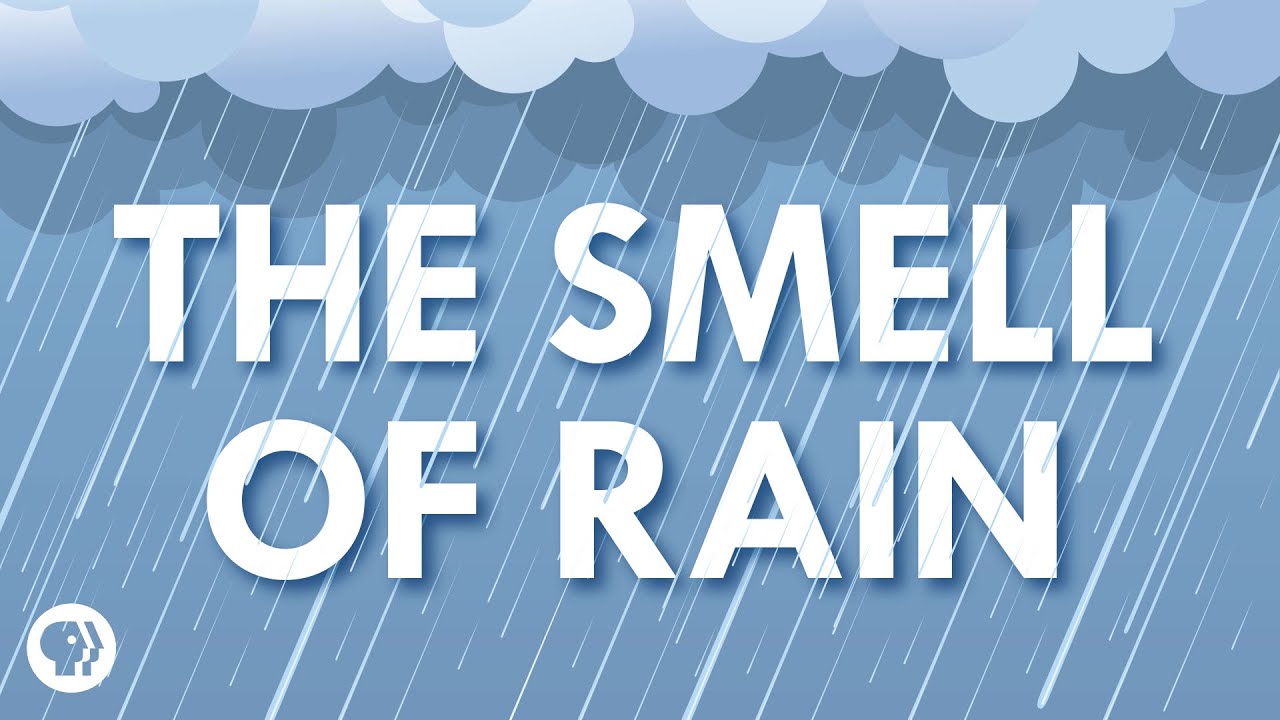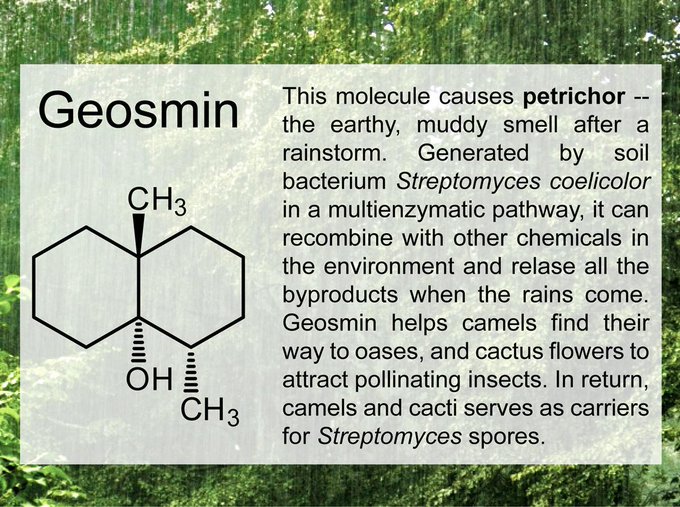Scientists Confirm Some People Can Smell Rain Coming
Despite the summer season, many Brits have experienced rainy days recently, while their European counterparts endure scorching temperatures exceeding 40 degrees Celsius. The unpredictability of weather forecasts often leaves people searching for alternative ways to predict impending rain and now scientists confirm some people can smell rain coming.
Author:Dr. Felix ChaosphereReviewer:Xander OddityJul 24, 2023324 Shares81K Views

Despite the summer season, many Brits have experienced rainy days recently, while their European counterparts endure scorching temperatures exceeding 40 degrees Celsius. The unpredictability of weather forecasts often leaves people searching for alternative ways to predict impending rain and now scientists confirm some people can smell rain coming.
Scientists Confirm Some People Can Smell Rain Coming, The Scent Called Petrichor
This method involves a phenomenon familiar to many—the delightful, fresh scent that lingers in the air after rainfall. This scent, known as petrichor, tends to be most potent when rain follows an extended period of sunshine—a rarity during this particular year.
Surprisingly, some individuals claim to possess the ability to detect bad weather before its arrival, sparking lively debates on social media. While proponents insist that they can indeed smell the rain in advance, skeptics dismiss it as a mere myth. Only science can provide concrete evidence to confirm or debunk this claim.
Interestingly, evidence does exist to support the notion that some people can smell rain before its arrival, primarily associated with the concept of petrichor.
What Is Petrichor?
The term "petrichor" finds its roots in Greek, combining "petros," meaning stone (as in petrify), and "ichor," the substance flowing through the veins of Greek gods. In 1964, Australian scientists Isabel Joy Bear and Richard G. Thomas introduced this word in a Nature article to describe the enchanting scent experienced when rain falls on parched soil.
Prior to the adoption of the term "petrichor," scientists referred to this scent as "argillaceous odour." Rainfall triggers the presence of three distinct chemical groups in the air, namely geosmin, ozone, and specific plant oils, which are otherwise absent during dry periods.
The Role Of Geosmin In Petrichor
Geosmin serves as the primary compound responsible for the captivating smell of rain. Derived from the Greek words "geo" (earth) and "osme" (smell), geosmin is a bicyclic alcohol produced by certain blue-green algae(cyanobacteria) and bacteria, predominantly Actinomyces, such as Streptomyces.
Its fragrance is characterized by earthy, musty, or muddy notes. Remarkably, humans exhibit high sensitivity to detecting geosmin's odor, perceiving it at levels as low as 5 parts per trillion. This ability to detect geosmin extends to many other animals as well. For instance, camels rely on its scent to locate water sources in deserts.
When the cyanobacteria and bacteria that produce geosmin die, they release this aromatic compound. As raindrops descend and strike the ground, they disturb geosmin and plant oils present on rocks and soil. The impact of raindrops also traps tiny air bubbles, which travel upwards through the raindrop and disperse into the air as aerosols, diffusing the captivating petrichor scent.
Ozone's Contribution To Petrichor
The invigorating scent of ozone in a thunderstorm primarily stems from lightning's influence. During a lightning strike, the energy breaks the chemical bonds holding nitrogen (N2) and oxygen (O2) molecules together. As a result, some oxygen molecules combine to form ozone (O3). Although a small amount of ozone in the air imparts a rain-like smell, excessive ozone levels can be harmful and lead to health issues, particularly exacerbating asthma.
The Role Of Volatile Plant Oils In Petrichor
During dry spells, plants release oils that serve as a protective mechanism against excessive water loss and prevent seed germination. This natural defense mechanism reduces the likelihood of seedlings sprouting and subsequently perishing due to insufficient moisture.
When rain arrives, these oils splash up and become airborne, contributing yet another earthy component to the enchanting petrichor fragrance. The principal oils responsible for this effect are stearic acid and palmitic acid, both of which possess a slight waxy, soapy aroma.

Humans Smell Rain Better Than Sharks Smell Blood - Science of Petrichor
The Symbiotic Relationship Of Geosmin And Springtails
Beyond our understanding of petrichor's chemical composition, recent research has shed light on its ecological purpose. Scientists have discovered that geosmin plays a vital role in forming a symbiotic relationship between certain bacteria and tiny, six-legged arthropods called springtails.
Streptomyces, a genus of bacteria responsible for the musty petrichor scent, produces unique chemical byproducts that serve as the foundation for numerous antibiotic, antifungal, and anticancer compounds. Interestingly, researchers found that 120 out of 122 studied Streptomyces species possess the gene to produce geosmin, implying that this ability must confer some selective advantage to the bacteria.
To investigate further, scientists set up a series of experiments using sticky traps baited with Streptomyces and soy flour in a woodland in Alnarp, Sweden. The pungent geosmin, along with another compound called 2-methylisoborneol (2-MIB), attracted springtails in large numbers.
These findings suggest that springtails evolved alongside Streptomyces to establish a mutually beneficial relationship. Springtails consume the bacteria, which are rich in geosmin, and, in return, help spread Streptomyces' spores through their feces and physical contact.
The bacteria appear to prefer springtails as carriers of their spores due to the arthropods' unique ability to cope with Streptomyces' chemical cocktails. While many compounds produced by Streptomyces are deadly to fungi, insects, and nematodes, springtails possess enzymes that can handle these chemical challenges, ensuring their survival and allowing them to disperse the bacteria's spores efficiently.

Where Does the Smell of Rain Come From?
Healing Properties Of Petrichor
Nature has long been recognized for its healing and therapeutic properties. The soothing sound of flowing water, the sight of lush green landscapes, and the fragrance of flowers have a profound impact on our mental and emotional well-being. Among nature's many sensory delights, the enchanting scent of petrichor after a rainfall holds a special place in the realm of therapeutic experiences.
The Aromatherapy Of Petrichor
Aromatherapy, the practice of using natural scents and essential oils for healing and relaxation, has gained popularity in recent years. Petrichor, with its earthy and comforting fragrance, fits naturally into the realm of aromatherapy. Breathing in the scent of rain on dry ground can evoke a sense of calmness, rejuvenation, and connection to the natural world.
Reducing Stress And Anxiety
The scent of petrichor has the power to alleviate stress and anxiety. Studies have shown that exposure to natural fragrances, such as the smell of wet soil and plants after rain, can significantly reduce cortisol levels—the hormone associated with stress—in the body. Inhaling petrichor triggers the release of neurotransmitters like serotonin and dopamine, promoting feelings of relaxation and happiness.
Enhancing Mood And Positivity
Petrichor is not just a pleasant scent; it can also enhance mood and foster positive emotions. The connection between nature and well-being is well-documented, and the fragrance of rain on dry ground further reinforces this bond. Many people report feeling uplifted, content, and serene when exposed to the aroma of petrichor.
Connecting To Nature's Rhythms
In our fast-paced and technology-driven world, we often find ourselves disconnected from the natural rhythms of the earth. Petrichor serves as a gentle reminder of our bond with nature and the cyclical patterns of the planet. Inhaling the scent of rain after a long dry spell can ground us in the present moment, fostering mindfulness and a sense of interconnectedness.
Petrichor In Mindfulness Practices
Mindfulness practices, such as meditation and yoga, often emphasize the importance of being fully present and attuned to the sensory experiences of the moment. Incorporating petrichor into mindfulness exercises can deepen the connection between mind, body, and nature. The fragrance of rain on dry ground can serve as an anchor, helping individuals remain centered and focused during their practice.
The Impact On Mental Health
The therapeutic effects of petrichor extend to individuals facing mental health challenges. For those dealing with depression, anxiety, or other mood disorders, exposure to the calming scent of petrichor can provide moments of respite and tranquility. The aroma of rain on dry earth offers a safe space for reflection and introspection, promoting emotional healing and resilience.
Bringing Nature Indoors
In regions where rainfall is infrequent or for individuals who may have limited access to natural environments, bringing the scent of petrichor indoors can be a simple yet effective way to experience the healing power of nature. Aromatherapy diffusers or scented candles that capture the essence of petrichor can create a nurturing and comforting atmosphere in any living space.
Petrichor And Ecotherapy
Ecotherapy, also known as nature therapy or green therapy, harnesses the therapeutic potential of the natural world to improve mental health and well-being. The aroma of petrichor becomes an integral part of ecotherapy practices, guiding individuals on a sensory journey of connection to the environment. Ecotherapy sessions often include outdoor experiences where participants can immerse themselves in the healing scents of nature, including the soothing fragrance of petrichor.
Embracing The Gift Of Petrichor
The healing power of petrichor is a testament to the wonders of the natural world and its impact on our mental and emotional health. As we become more mindful of our surroundings and attuned to the sensory delights that nature offers, we open ourselves up to a wealth of therapeutic experiences.
So, the next time you catch a whiff of that delightful scent in the air after rain, take a moment to embrace the gift of petrichor and its potential to enhance your well-being. Let the fragrance of rain on dry ground be a gentle reminder of the healing embrace of nature and its ability to nurture not only our bodies but also our minds and souls.
People Also Ask
Why Are Humans So Sensitive To Petrichor?
The human nose is highly sensitive to geosmin and can detect it at concentrations as low as 0.4 parts per billion. Some scientists believe that humans appreciate the scent of rain because our ancestors relied on rainy weather for survival.
Does Everyone Smell Petrichor?
When certain microbes die, they release a musty earth-smelling chemical called geosmin, which is the main contributor to petrichor. However, approximately one out of every ten people cannot smell geosmin and, therefore, may not experience petrichor's distinctive aroma.
Can Dogs Smell Rain?
Yes, dogs have superior senses, and their keen sense of smell allows them to detect changes in the environment, including the approach of rain. They can pick up the scent of rain and the static electricity caused by lightning, allowing them to sense storms before they arrive.
What Smell Are Humans Most Sensitive To?
Humans are most sensitive to thiols, sulfur-containing compounds that produce strong odors. These odors can be associated with things to avoid, such as gas leaks, garlic breath, and skunks in the neighborhood.
What Is The Strongest Smell On Earth?
The strongest smells on Earth include hydrogen sulfide, found in volcanic areas like Reykjavik, raw sewage, the corpse flower, and rotten flesh. Thioacetone, which can cause a highly unpleasant odor, and the infamous durian fruit are also among the strongest-smelling substances.
Which Gender Is More Sensitive To Smell?
Women tend to have a higher sensitivity to smell compared to men. On standard tests of smelling ability, including odor detection, discrimination, and identification, women consistently score significantly higher than men. This heightened olfactory ability is evident even in newborn babies.
How Do You Pronounce Petrichor?
Petrichor is pronounced as "PET-ri-kor," with the emphasis on the first syllable.

How to Pronounce Petrichor
Conclusion
In conclusion, scientists confirm some people can smell rain coming and the enchanting scent of petrichor, created when rain falls on dry ground, continues to captivate and connect us with the wonders of nature. This unique ability to detect rain's arrival adds a touch of magic to our sensory experiences and serves as a gentle reminder of the beauty and interconnectedness of the natural world. Let us cherish the gift of petrichor and revel in the mysteries it unveils in the embrace of nature's aromatic essence.
Jump to
Scientists Confirm Some People Can Smell Rain Coming, The Scent Called Petrichor
What Is Petrichor?
The Role Of Geosmin In Petrichor
Ozone's Contribution To Petrichor
The Role Of Volatile Plant Oils In Petrichor
The Symbiotic Relationship Of Geosmin And Springtails
Healing Properties Of Petrichor
People Also Ask
Conclusion

Dr. Felix Chaosphere
Author
Dr. Felix Chaosphere, a renowned and eccentric psychiatrist, is a master of unraveling the complexities of the human mind. With his wild and untamed hair, he embodies the essence of a brilliant but unconventional thinker. As a sexologist, he fearlessly delves into the depths of human desire and intimacy, unearthing hidden truths and challenging societal norms.
Beyond his professional expertise, Dr. Chaosphere is also a celebrated author, renowned for his provocative and thought-provoking literary works. His written words mirror the enigmatic nature of his persona, inviting readers to explore the labyrinthine corridors of the human psyche.
With his indomitable spirit and insatiable curiosity, Dr. Chaosphere continues to push boundaries, challenging society's preconceived notions and inspiring others to embrace their own inner tumult.

Xander Oddity
Reviewer
Xander Oddity, an eccentric and intrepid news reporter, is a master of unearthing the strange and bizarre. With an insatiable curiosity for the unconventional, Xander ventures into the depths of the unknown, fearlessly pursuing stories that defy conventional explanation. Armed with a vast reservoir of knowledge and experience in the realm of conspiracies, Xander is a seasoned investigator of the extraordinary.
Throughout his illustrious career, Xander has built a reputation for delving into the shadows of secrecy and unraveling the enigmatic. With an unyielding determination and an unwavering belief in the power of the bizarre, Xander strives to shed light on the unexplained and challenge the boundaries of conventional wisdom. In his pursuit of the truth, Xander continues to inspire others to question the world around them and embrace the unexpected.
Latest Articles
Popular Articles
